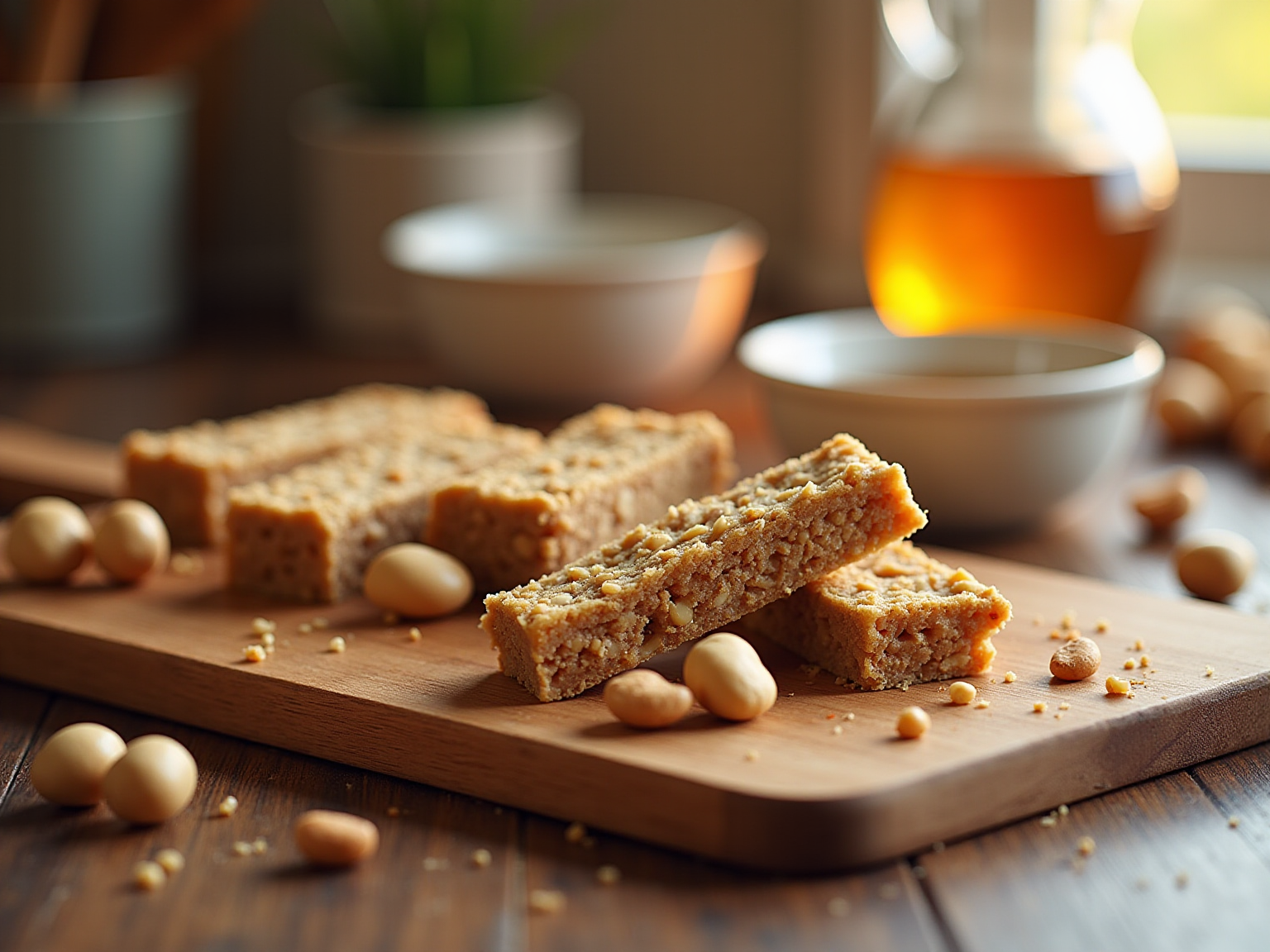Macadamia Nut Bar vs. Other Nut Bars: Nutritional Insights
Overview
The article highlights the unique nutritional benefits of macadamia nut bars in comparison to other nut bars, particularly their higher content of monounsaturated fats and essential nutrients.
Furthermore, it details how these bars contribute to heart health and maintain lower sugar levels than other nut varieties.
As a result, macadamia nut bars emerge as a healthier choice for consumers who prioritize nutrition and wellness. This makes them an appealing option for those seeking to improve their dietary habits.
Introduction
As the quest for healthier snack options continues to gain momentum, macadamia nut bars have emerged as a standout choice for health-conscious consumers. These bars are packed with beneficial monounsaturated fats and essential nutrients, supporting heart health and contributing to overall well-being. Furthermore, their impressive fiber content promotes satiety and aids digestion, making them an ideal snack for those looking to manage their weight.
This article delves into the nutritional benefits of macadamia nut bars, compares them to other nut varieties, and explores the implications of their unique composition on health and longevity. As awareness of dietary choices grows, understanding the value of these nutrient-rich snacks becomes increasingly important in the pursuit of a healthier lifestyle.
Understanding Macadamia Nut Bars: Nutritional Benefits and Unique Features
Macadamia nut snacks are gaining traction among health-conscious consumers due to their impressive nutritional profile. Did you know that consistent consumption of nuts, including certain varieties, could reduce your chance of dying early by approximately one-third? This is supported by Alina Petre, MS, RD (NL). Loaded with nuts, these snacks are especially high in monounsaturated fats, particularly oleic acid, which is recognized for promoting heart health. A standard portion of a nut bar contains roughly 15-20 grams of fat, primarily sourced from these nutritious ingredients. In addition to healthy fats, they are rich in essential nutrients like manganese, thiamin, and magnesium, all crucial for various metabolic functions.
The fiber content in nut snacks not only supports digestion but also enhances feelings of fullness, making them an excellent option for individuals managing their weight. With a low carbohydrate content, these snacks align well with low-carb dietary preferences, appealing to those dedicated to enhancing their vitality as they age. Recent studies suggest that regular intake of nuts, including certain varieties, may lower the risk of early death by approximately one-third, further highlighting their health advantages. Furthermore, these nuts are a notable source of potassium, with one 40g bar offering 94mg, which aids overall heart health.
Convenience is another advantage; these snacks can be stored at room temperature for one to five months or in the refrigerator for up to one year. This distinctive mix of healthy fats, fiber, and vital vitamins, combined with insights from the Hunza people’s diet—emphasizing quality animal-based foods and longevity—positions the macadamia nut bar as a healthful and fulfilling choice. ByKomi.com blends culinary expertise and scientific exploration to underscore the importance of such foods in an anti-aging diet.
Exploring Other Nut Bars: Varieties, Ingredients, and Health Implications
The market offers a diverse selection of nut snacks, including almond, cashew, and mixed varieties, each boasting unique nutritional profiles. Almond snacks are particularly noted for their high vitamin E and protein content, while cashew treats are recognized for their magnesium levels. However, many commercially available options are often laden with added sugars and unhealthy fats, which can undermine their health benefits. For instance, some snacks may contain syrups or chocolate coatings, leading to calorie counts that can soar to 20 grams of sugar per serving. This underscores the necessity of scrutinizing ingredient labels. In contrast, macadamia nut bars made primarily from whole nuts with minimal additives tend to be healthier, providing essential nutrients without excessive empty calories. As consumer awareness increases, the demand for low-sugar alternatives is on the rise, prompting manufacturers to reformulate their products to align with these preferences. This shift reflects the growing recognition that every dietary decision impacts overall well-being, echoing Heather Morgan’s sentiment that ‘Every time you eat or drink, you are either feeding disease or fighting it.’
Moreover, insights gained from Dr. Joseph Dituri’s underwater studies reveal the potential for innovative nutritional practices to enhance well-being and longevity. Just as the Hunza people have thrived on their distinctive diet, which supports their impressive longevity, health-conscious individuals can gain from making informed choices about their snacks. The COVID-19 pandemic has influenced sugar consumption trends, increasing reliance on processed foods while simultaneously raising awareness about diet and wellness.
The case study titled ‘Trends in Sugar Alternatives and Consumer Preferences’ illustrates this burgeoning demand for healthier options, reinforcing the notion that nutrition plays a critical role in combating disease. As Friedrich Nietzsche noted, ‘these small things – nutrition, place, climate, recreation, the whole casuistry of selfishness – are inconceivably more important than everything one has taken to be important so far.
Comparative Analysis: Macadamia Nut Bars vs. Other Nut Bars on Nutritional Value and Health Impact
When comparing a specific nut snack to other nut snacks, several nutritional factors come into play. Macadamia nut bars are distinguished by their higher fat content, mainly from beneficial monounsaturated fats, which are known for promoting heart health and reducing inflammation. For instance, a standard nut bar may contain around 15 grams of fat and 5 grams of protein, while an almond bar typically offers about 10 grams of fat and 7 grams of protein. Each ounce of these nuts—or roughly 10-12 kernels—delivers about 2.2 grams of plant-based protein, underscoring their nutritional value. This increased fat content in nut snacks can be advantageous for individuals aiming to incorporate healthy fats into their diet.
Furthermore, these nuts are rich in omega-3 and omega-7 fatty acids, enhancing their anti-inflammatory properties and contributing to cardiovascular health. In contrast, although almond snacks may provide a higher protein content, they often lack the same level of healthy fats. Additionally, nut treats frequently boast a higher fiber content, beneficial for digestive health. Notably, almonds contain more linoleic acid than macadamia-style snacks, with 12.324 grams per 100 grams compared to 1.303 grams in macadamia-style snacks, indicating a difference in fatty acid profiles.
However, it is crucial to consider the potential downsides of certain nut-based products, especially those with added sugars, which can lead to spikes in blood sugar levels—a significant concern for individuals managing diabetes. Studies indicate that consuming these nuts may help reduce the risk of complications related to elevated blood sugar, making them a smart choice for health-conscious individuals. Moreover, these seeds are plentiful in flavonoids and tocotrienols, antioxidants that have shown promise in cancer prevention, suggesting additional health benefits.
Ultimately, while these snacks provide distinct health advantages, the decision between them and other seed snacks should align with individual dietary needs and health objectives. A comparative analysis reveals that both types of nut bars, including the macadamia nut bar and almonds, have their strengths, and understanding their nutritional profiles can empower consumers to make informed snacking choices. The ongoing discussion about raw versus roasted macadamia nuts further emphasizes the significance of preparation methods, which may shape consumer preferences.
Conclusion
Macadamia nut bars stand out as a nutritious snack choice, rich in monounsaturated fats and essential nutrients that support heart health and overall well-being. Their high fiber content not only aids digestion but also promotes satiety, making them particularly appealing for those managing their weight. Compared to other nut varieties, macadamia nut bars offer a unique blend of healthy fats and lower carbohydrate content, aligning with the dietary preferences of many health-conscious consumers.
While there are various nut bars available on the market, the nutritional benefits of macadamia nut bars are noteworthy. They provide a higher fat content from beneficial sources, which can help reduce inflammation and support cardiovascular health. In contrast, some nut bars may contain added sugars and unhealthy fats that can negate their health benefits. As awareness about the importance of dietary choices continues to grow, understanding the nutritional profiles of different nut bars becomes essential for making informed snack selections.
Ultimately, incorporating macadamia nut bars into a balanced diet can contribute to a healthier lifestyle. Their unique composition not only aligns with the pursuit of longevity, as seen in the dietary habits of the Hunza people, but also offers a satisfying snack option that can help combat various health issues. As consumers increasingly prioritize health-conscious choices, macadamia nut bars emerge as a delicious and nutrient-dense alternative in the quest for better nutrition.
Frequently Asked Questions
Why are macadamia nut snacks popular among health-conscious consumers?
Macadamia nut snacks are gaining popularity due to their impressive nutritional profile, including high levels of monounsaturated fats, essential nutrients, and fiber, which support heart health and digestion.
How can consistent consumption of nuts affect longevity?
Regular consumption of nuts, including macadamia nuts, may reduce the chance of dying early by approximately one-third, according to studies.
What are the main health benefits of the fats found in macadamia nuts?
The fats in macadamia nuts are primarily monounsaturated fats, particularly oleic acid, which is recognized for promoting heart health.
What essential nutrients are found in macadamia nut snacks?
Macadamia nut snacks are rich in essential nutrients like manganese, thiamin, magnesium, and potassium, all of which are crucial for various metabolic functions and overall health.
How does the fiber content in nut snacks benefit consumers?
The fiber in nut snacks supports digestion and enhances feelings of fullness, making them a good option for individuals managing their weight.
Are macadamia nut snacks suitable for low-carb diets?
Yes, macadamia nut snacks have a low carbohydrate content, making them suitable for those following low-carb dietary preferences.
How long can macadamia nut snacks be stored?
These snacks can be stored at room temperature for one to five months or in the refrigerator for up to one year.
What dietary insights support the health benefits of macadamia nuts?
Insights from the Hunza people’s diet, which emphasizes quality animal-based foods and longevity, support the health benefits of macadamia nuts as part of an anti-aging diet.






